Age Analysis Of Rio Swimming Finalists: The Older The Better!
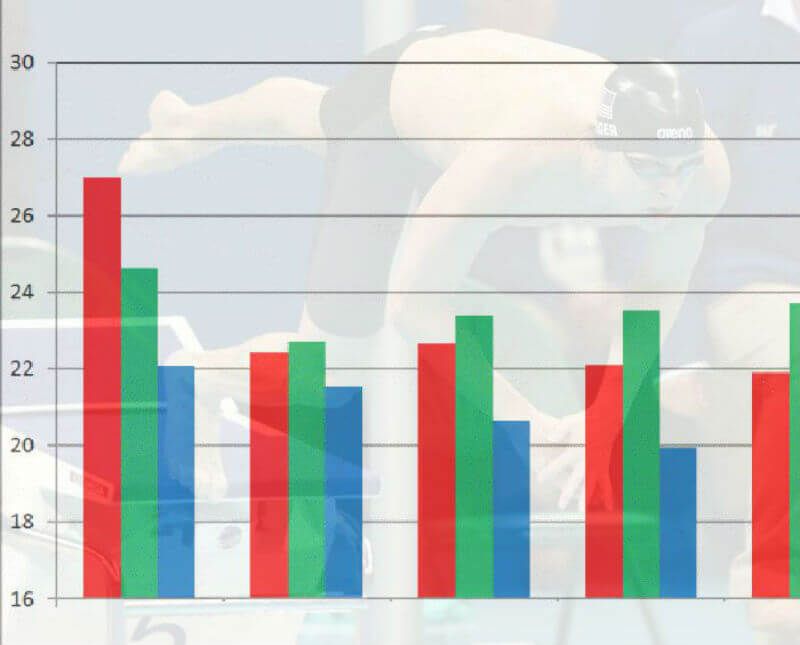
Commentary by Coach Rick Madge
This is the second of a series involving analysis of Rio Olympics swimming stats. In this one we look at the age statistics for Rio finalists.
This analysis includes the ages for all 2012 and 2016 Olympic individual event finalists. In addition, I’ll also compare these to the ages for 2016 Olympic Trial finalists from Canada, Australia, Britain, Japan, Russia and Brazil as presented in a previous post here.
Let’s first look at the overall average ages.
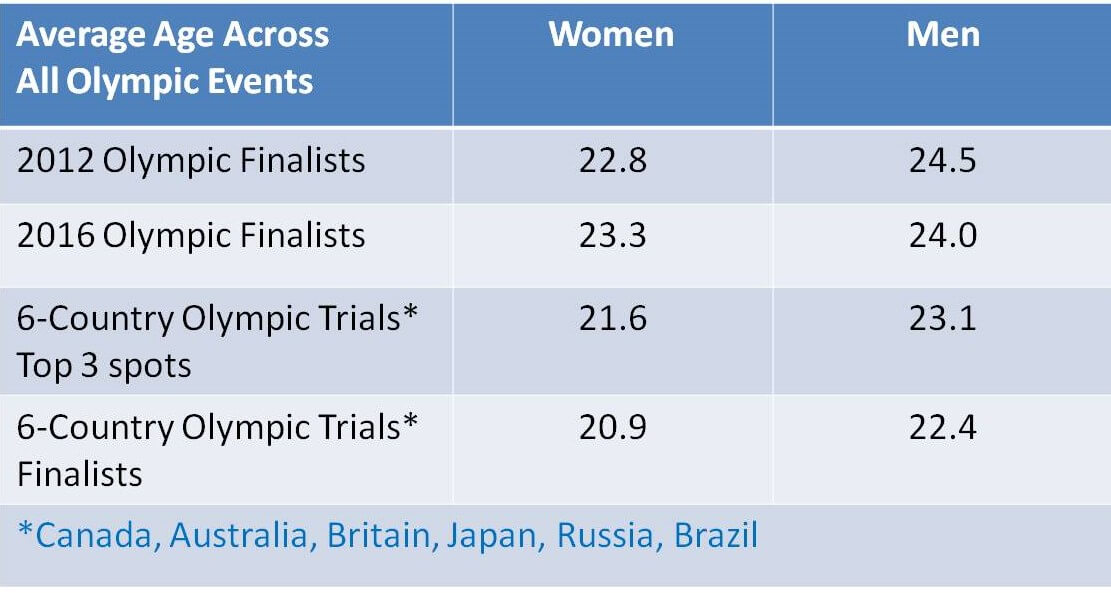
Photo Courtesy: Coach Rick Madge
Here’s where we get the big surprise. The youngest average age is for finalists from our 6-country analysis. Almost a year older than them is the average age for the top 3 from our 6-country analysis. Then 1-2 years older than that is the average age of Olympic finalists. And while its very tempting, there just aren’t enough data points to confidently extend this analysis to the average age of Olympic medallists.
In other words, the better the swimmers, the older the average age!
We can also see that the average age for men is roughly 1.5 years older than the average age for women.
Lastly, there appears to be no appreciable difference between the average ages for the 2012 and 2016 finalists.
We’ll now breakdown the average ages by distance.
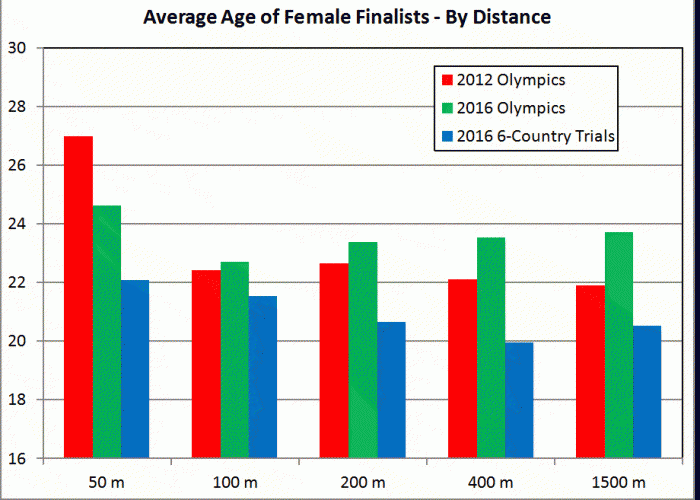
Photo Courtesy: Coach Rick Madge
Other than a slightly older age for swimmers in the 50 FR for both 2012 and 2016, there doesn’t seem to be any patterns to the Olympic ages by distance. It’s interesting to note, however, that for our 6-country trial finalists, the shorter the distance, the older the swimmer.
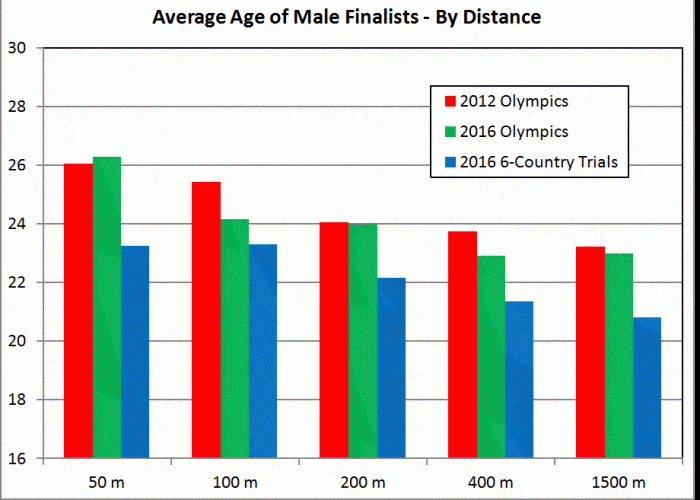
Photo Courtesy: Coach Rick Madge
There’s definitely a pattern with the men’s distances. In all 3 cases, the shorter the distance, the older the swimmer. The average age of 50 sprinters is roughly 3 years older than distance swimmers. Perhaps this additional time allows them to build more strength.
Next, we’ll look at the breakdown by stroke.
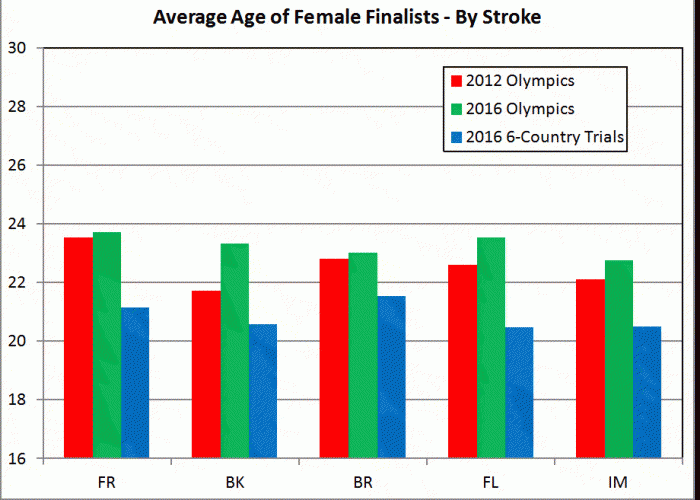
Photo Courtesy: Coach Rick Madge
There appears to be no significant correlation of age versus stroke for any of our 3 cases. At least for women, mastery of each of the strokes appears to take the same amount of time.
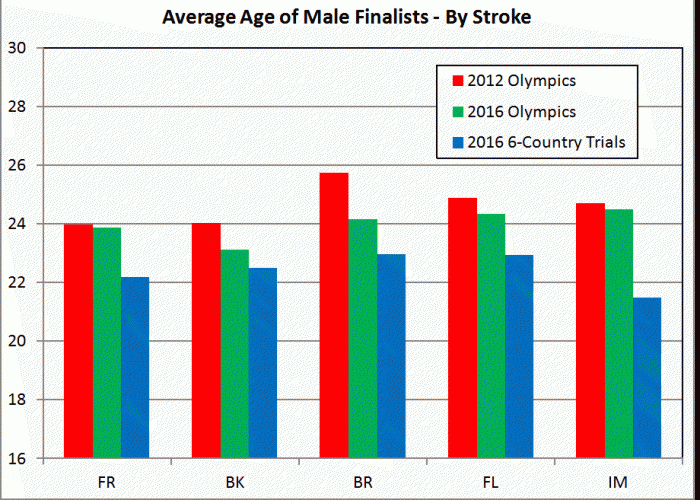
Photo Courtesy: Coach Rick Madge
Here again, the men are different than the women. We see a definite increase in age for BR and FL for all 3 cases, and even a slightly increase in age for IM for the Olympic finalists. Perhaps it’s the additional strength component in these short-axis strokes that allows older and stronger swimmers to excel.
Finally, we’ll look at the youngest and oldest swimmers who made the London and Rio finals.

Photo Courtesy: Coach Rick Madge
As we can see, there are no significant differences in the age ranges between the two Olympics. Both show an incredibly long competitive span for elite performance. It’s also interesting to note that the low end of the range for men is 1.5 – 2 years older than the low range for women. Again, it’s possible that younger men haven’t yet developed the strength to compete against the older, stronger men.
For information on the age ranges for individual events, you can visit coachrickswimming.com.
Rick Madge writes the coachrickswimming.com blog, and is head coach of the Mighty Tritons Aquatic Club in Milton, Ontario, Canada.




Not sure if you have done this or are planning it but it would be interesting to compare Olympic Trial times with Olympic Final times as there is a wide difference among countries on the time between trials and Olympic finals.
David Abineri
Thanks David! I’ll make sure to pass that along to the author.
Interesting idea, David. I have thought about that one, but it’s pretty complex to compare the two completely different situations. Most countries use an early trials (about 4 months out), and there are plenty of mixed results. Japan, Britain and Canada did fantastic, while Australia, Russia, Brazil and China didn’t quite perform as they wanted. In other words, trying to determine a correlation between early/late trials and performance will be just about impossible. I strongly suspect that other factors are far more important in influencing the performance of countries than the timing of the trials. Pressure, expectations, mental preparation, etc are probably the key factors. For Russian swimmers, you can probably add the incredible distraction and negative atmosphere surrounding the release of the McLaren report.
In other words, correlations work when we’re dealing with primary factors affecting results. And it doesn’t look like the timing of the trials is anywhere close to a primary factor. If you want to see some humourous spurious correlations, check out this National Geographic article where it shows that # of drownings in pools is directly correlated with # of films that Nicolas Cage is in for any given year. http://phenomena.nationalgeographic.com/2015/09/11/nick-cage-movies-vs-drownings-and-more-strange-but-spurious-correlations/